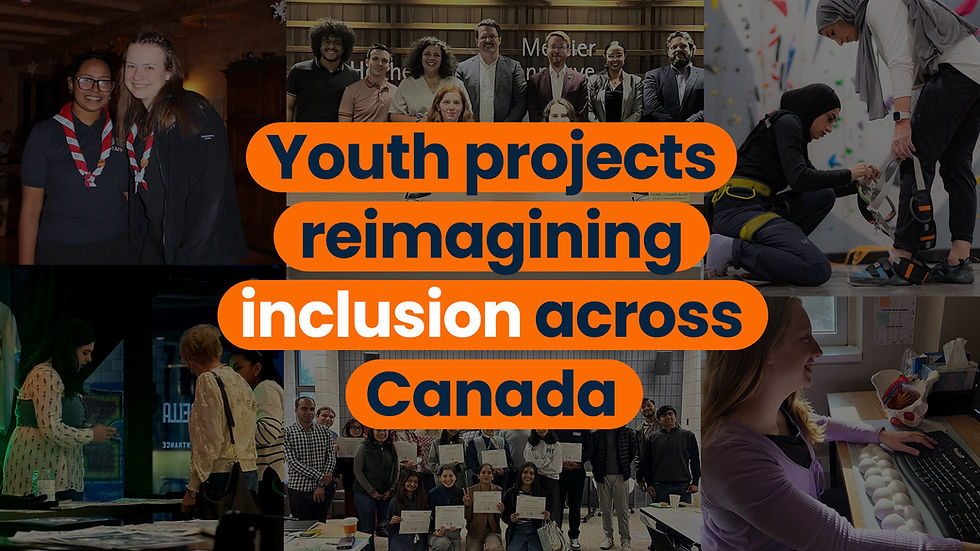What can young people do to take action on climate change?
- See Different

- Apr 3, 2025
- 4 min read
Updated: Apr 19, 2025

Climate change is one of the most pressing issues of our time, and young people around the world are stepping up to lead the charge for a more sustainable future. Whether you're passionate about environmental justice, interested in reducing waste, or simply want to do your part, there are many ways to take meaningful action.
In this blog, we spoke to a representative from Canadian organization Ocean Wise to hear from someone working on the front lines about what young people can do to take action on climate change.
GETTING STARTED

The climate crisis can feel overwhelming. From fossil fuels to plastic and textile waste, this massive global problem does not have an easy solution. These issues are deeply embedded in existing social and economic structures that have existed for centuries, which can make them feel even more daunting.
Yet, despite the scale of the problem, meaningful action is possible. Around the world, individuals, businesses, and communities are finding innovative ways to reduce waste, lower emissions, and shift toward more sustainable practices. While large-scale policy changes and corporate accountability play a critical role, everyday choices—like reducing single-use plastics, supporting ethical brands, and advocating for systemic change—also contribute to the momentum needed for lasting impact.
The key is recognizing that solutions to the climate crisis are not one-size-fits-all. What works in one region or industry may not be feasible in another, and sustainability must be approached with both adaptability and inclusivity. Many front line communities, particularly those most affected by climate change, have long practiced resourcefulness and conservation out of necessity. Their knowledge and leadership are vital in driving equitable and long-lasting change.
Rather than succumbing to climate despair, we can focus on the power of collective action.
Change happens not only through sweeping policies and technological advancements, but through the everyday efforts of people committed to a more sustainable future.
Here are some ways individuals and communities are making an impact:
Rethinking consumption: Many are choosing reusable products, reducing waste, and supporting ethical brands to shift demand toward more sustainable industries.
Supporting climate-conscious initiatives: People are backing sustainable businesses, joining conservation efforts, and advocating for policies that protect the planet.
Holding decision-makers accountable: Communities are voting for climate-focused leaders, signing petitions, attending protests, and pushing for corporate and government action.
Every action, big or small, contributes to a larger movement for a sustainable future.

CANADIAN STATISTICS ON CLIMATE CHANGE
Canada is experiencing significant climate changes that underscore the urgent need for comprehensive environmental strategies. These are some recent statistics that highlight the scale of the problem:
2023 was the most destructive wildfire season on record, with over 15 million hectares burned. Source: Canada.ca
9 of the 10 warmest years in Canada have occurred during the last 25 years. *With 2024 being the warmest on record. Source: Noaa.gov
The average cost per weather-related disaster has jumped 1250% since the 1970s. A typical storm or flood that cost roughly $8 million in the early 1970’s now costs over $110 million. Source: Climateintsitute.ca
These statistics highlight the pressing need for effective climate action to mitigate ongoing environmental impacts. They also lead us to an incredible organization, and individual, dedicated to addressing climate change through marine conservation, research, and education.
PROFILE: OCEAN WISE

Amy Charles is the Indigenous Knowledge Specialist at Ocean Wise. She became personally involved in climate activism when she was only 16 years old. Travelling to different regions and witnessing the impacts of climate change on ecosystems and people, especially Indigenous communities, solidified her commitment to advocating for climate action. Additionally, she explains:
“My reconnection to my Métis heritage deepened my understanding of stewardship and the importance of having an interconnected relationship with the planet, which has fueled my passion for conservation and sustainability.”
Here are 3 things she suggests for anyone interested in becoming involved in climate activism:
Educate yourself and others: Learn about climate science, Indigenous land stewardship practices, and how different communities are affected by climate change. Explore concepts like Two-Eyed Seeing, which bridges Indigenous and Western knowledge systems, and the Two Row Wampum Belt, a framework for respectful and reciprocal relationships. Take the time to learn about the land you reside on and call home, including its history, ecosystems, and the Indigenous Peoples who have lived there since time immemorial. Share this knowledge to inspire meaningful action.
Adopt climate-conscious habits: Reduce waste by rethinking consumption, choosing reusable or low-impact alternatives, and minimizing single-use plastics. Support businesses that prioritize sustainability and ethical production. Be mindful of your food choices by opting for sustainable seafood and reducing food waste. Advocate for environmental policies in your school, workplace, and community.
Get involved in local initiatives: Join climate action groups, participate in conservation projects like Ocean Wise youth programs, and use your voice to encourage conversation for change in your community.
CONCLUSION
Taking action on climate change doesn’t require grand gestures or unlimited resources—small, consistent efforts can create lasting impact. Whether it’s reducing personal consumption, advocating for sustainable policies, or supporting businesses that prioritize the planet, young people have the power to drive meaningful change.
By staying informed, speaking up, and leading by example, they can inspire others to join the movement toward a more sustainable future. The climate crisis is urgent, but with collective action, innovation, and resilience, young people can help shape a world that is greener, fairer, and more sustainable for generations to come.




Comments